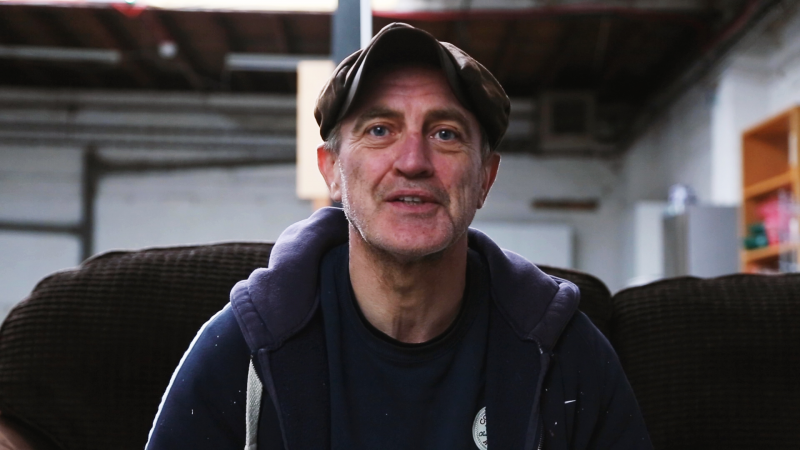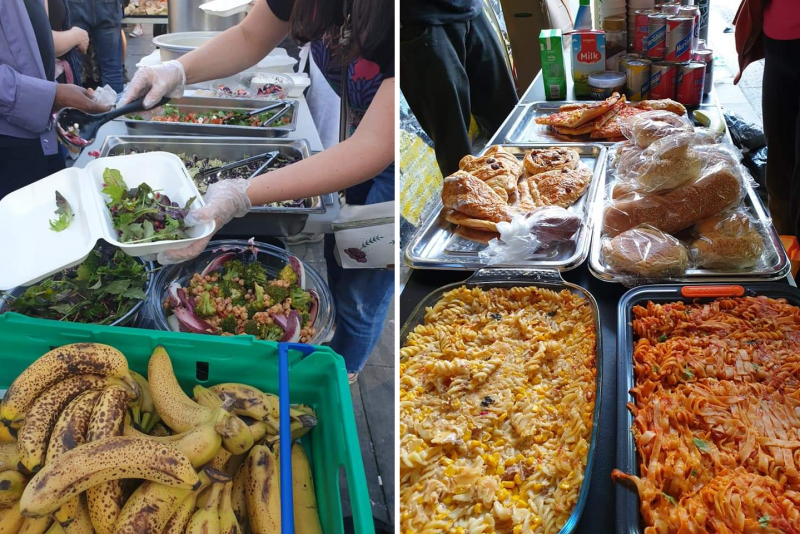
Established 2005 Registered Charity No. 1110656
Scottish Charity Register No. SC043760
DONATE
RECENT TWEETS
 Streets Kitchen founder Jon Glackin: “We operate on the streets and we are not exclusive, everybody can use our services.” @ Nina B/Snack Productions
Streets Kitchen founder Jon Glackin: “We operate on the streets and we are not exclusive, everybody can use our services.” @ Nina B/Snack Productions
Jacqueline Messih meets Jon
Glackin from Streets Kitchen,
a grassroots solidarity group
that aims to provide food,
clothing and information
through daily outreaches
across London. At the heart of
this operation is people and
food
Jon Glackin is a founding member of Streets Kitchen. He believes food is a basic human right and Streets Kitchen fulfils that right. "Food is vital. The clue’s in the name, we try to bring the kitchen to the streets, it’s a simple service: everybody has the right to eat,” says Jon. Streets Kitchen does not only serve the homeless but also those on low incomes. The food is cooked by volunteers and is generally vegetarian and full of nutrition. To help people with sore teeth nothing is served that is too hard and there’s the option of hot or cold food. Also on offer are fruit, sweet treats, teas and coffees, but most importantly comes advice and conversation, establishing a sense of community and rapport.
On a typical outreach you will observe food as the centre of attention. Some people gather around the table and some join conversations, dispersed into small groups. The heat which radiates from the hot food and drinks creates a warming feeling, kissing the cold air and bringing relief to worn cheeks.
With so many people using the service, it begs the question whether homeless people have enough access to food? Jon notes: “Most other services are indoors and have certain rules and regulations, so some people mistrust it and come to us instead. We operate on the streets and we are not exclusive, everybody can use our services. We also signpost to other essential services.”
Jon adds that: “Food banks sadly are an essential part of life now. Ten years ago there weren’t so many but now it’s the fastest growing industry in the UK. But food bank food is meant to be cooked at home; spaghetti, potatoes, canned beans, so that’s a problem for the homeless community.”
Streets Kitchen operates on minimal spending by using food destined for waste: “There’s plenty of food being wasted and we sometimes access that food before it’s thrown out. We get food from Nando’s, City Harvest, Felix Project give to Refugee Community Kitchen and there are a lot of food waste groups now because people are beginning to recognise how much food is being wasted. If food waste were a country, it would be the third largest polluter in the world!”
Food banks also lack in nutritional foods and as a result Jon finds food poverty to be an issue, but not in the sense you might think. There’s “good food poverty," Jon says. “We get lots of pasta, potatoes and canned or packet food, but in terms of fresh vegetables that’s lacking. This is why we’ve set up some garden projects. In Islington we have a number of plots that grow fresh veg for us.”

Evening meal from Streets Kitchen © Jacqueline Messih
Jon acknowledges there is a link between food and death: “Homeless people die much younger than. people who are housed, there can be almost 30-years difference. That is due to lack of somewhere to live, lack of a healthy diet, poor health and bad habits that one could develop living on the streets, so a good diet is vital.” Streets Kitchen is a model that can be replicated anywhere but people use it because they are hungry. The only issue Jon sees for the future is that licences may need to be obtained in order to operate and serve food on the streets. In places like Westminster, there’s already an attack on food runs with talk of licenses – essentially making it harder to run services.
Jon stresses that in today’s world everybody seems to be struggling, not just the homeless community. “I created Streets Kitchen, to change the terminology and narrative, to make it more inclusive. It’s not just homeless people we serve, we serve people in hostels, people newly accommodated, people who have lost their benefits or have been sanctioned. We meet hundreds of hungry people every day.”
In a nutshell
- Streets Kitchen serves on average 1,000 people a week around London. It relies solely on volunteers.
- Founding member Jon Glackin’s catchphrase is “solidarity not charity”. Anyone is welcome.
- “Research has been done on the correct food to give to people who are living on the streets. It needs to contain more fats, vitamins and be food with high energy particularly if you are sleeping in the cold or walking around a lot just burning energy,” says Jon.
- Hungry in Edinburgh and Glasgow? Social Bite, a social enterprise set up in 2012, gives away food, and runs an academy employing people affected by homelessness (32 in 2018) and supports homeless people to volunteer (45 in 2018).
- See www.social-bite.co.uk
February – March 2026 : Progress
CONTENTS
BACK ISSUES
- Issue 160 : February – March 2026 : Progress
- Issue 159 : December 2025 – January 2026 : Resolutions
- Issue 158 : October – November 2025 : Making a difference
- Issue 157 : August – September 2025 : Caring about care
- Issue 156 : June – July 2025 : Resilience
- Issue 155 : April – May 2025 : Second Chances
- Issue 154 : February – March 2025 : Time
- Issue 153 : December 2024 – January 2025 : Solidarity
- Issue 152 : October – November 2024 : Change
- Issue 151 : August – September 2024 : Being Heard
- Issue 150 : June – July 2024 : Reflections
- Issue 149 : April – May 2024 : Compassion
- Issue 148 : February – March 2024 : The little things
- Issue 147 : December 2023 – January 2024 : Next steps
- Issue 146 : October 2023 – November 2023 : Kind acts
- Issue 145 : August 2023 – September 2023 : Mental health
- Issue 144 : June 2023 – July 2023 : Community
- Issue 143 : April 2023 - May 2023 : Hope springs
- Issue 142 : February 2023 - March 2023 : New Beginnings
- Issue 141 : December 2022 - January 2023 : Winter Homeless
- Issue 140 : October - November 2022 : Resolve
- Issue 139 : August - September 2022 : Creativity
- Issue 138 : June - July 2022 : Practical advice
- Issue 137 : April - May 2022 : Connection
- Issue 136 : February - March 2022 : RESPECT
- Issue 135 : Dec 2021 - Jan 2022 : OPPORTUNITY
- Issue 134 : September-October 2021 : Losses and gains
- Issue 133 : July-August 2021 : Know Your Rights
- Issue 132 : May-June 2021 : Access to Healthcare
- Issue 131 : Mar-Apr 2021 : SOLUTIONS
- Issue 130 : Jan-Feb 2021 : CHANGE
- Issue 129 : Nov-Dec 2020 : UNBELIEVABLE
- Issue 128 : Sep-Oct 2020 : COPING
- Issue 127 : Jul-Aug 2020 : HOPE
- Issue 126 : Health & Wellbeing in a Crisis
- Issue 125 : Mar-Apr 2020 : MOVING ON
- Issue 124 : Jan-Feb 2020 : STREET FOOD
- Issue 123 : Nov-Dec 2019 : HOSTELS
- Issue 122 : Sep 2019 : DEATH ON THE STREETS
- Issue 121 : July-Aug 2019 : INVISIBLE YOUTH
- Issue 120 : May-June 2019 : RECOVERY
- Issue 119 : Mar-Apr 2019 : WELLBEING
- Issue 118 : Jan-Feb 2019 : WORKING HOMELESS
- Issue 117 : Nov-Dec 2018 : HER STORY
- Issue 116 : Sept-Oct 2018 : TOILET TALK
- Issue 115 : July-Aug 2018 : HIDDEN HOMELESS
- Issue 114 : May-Jun 2018 : REBUILD YOUR LIFE
- Issue 113 : Mar–Apr 2018 : REMEMBRANCE
- Issue 112 : Jan-Feb 2018
- Issue 111 : Nov-Dec 2017
- Issue 110 : Sept-Oct 2017
- Issue 109 : July-Aug 2017
- Issue 108 : Apr-May 2017
- Issue 107 : Feb-Mar 2017
- Issue 106 : Dec 2016 - Jan 2017
- Issue 105 : Oct-Nov 2016
- Issue 104 : Aug-Sept 2016
- Issue 103 : May-June 2016
- Issue 102 : Mar-Apr 2016
- Issue 101 : Jan-Feb 2016
- Issue 100 : Nov-Dec 2015
- Issue 99 : Sept-Oct 2015
- Issue 98 : July-Aug 2015
- Issue 97 : May-Jun 2015
- Issue 96 : April 2015 [Mini Issue]
- Issue 95 : March 2015
- Issue 94 : February 2015
- Issue 93 : December 2014
- Issue 92 : November 2014
- Issue 91 : October 2014
- Issue 90 : September 2014
- Issue 89 : July 2014
- Issue 88 : June 2014
- Issue 87 : May 2014
- Issue 86 : April 2014
- Issue 85 : March 2014
- Issue 84 : February 2014
- Issue 83 : December 2013
- Issue 82 : November 2013
- Issue 81 : October 2013
- Issue 80 : September 2013
- Issue 79 : June 2013
- Issue 78 : 78
- Issue 77 : 77
- Issue 76 : 76
- Issue 75 : 75
- Issue 74 : 74
- Issue 73 : 73
- Issue 72 : 72
- Issue 71 : 71
- Issue 70 : 70
- Issue 69 : 69
- Issue 68 : 68
- Issue 67 : 67
- Issue 66 : 66
- Issue 65 : 65
- Issue 64 : 64
- Issue 63 : 63
- Issue 62 : 62
- Issue 61 : 61
- Issue 60 : 60
- Issue 59 : 59
- Issue 58 : 58
- Issue 57 : 57
- Issue 56 : 56
- Issue 56 : 56
- Issue 55 : 55
- Issue 54 : 54
- Issue 53 : 53
- Issue 52 : 52
- Issue 51 : 51
- Issue 50 : 50
- Issue 49 : 49
- Issue 48 : 48
- Issue 47 : 47
- Issue 46 : 46
- Issue 45 : 45
- Issue 44 : 44
- Issue 43 : 43
- Issue 42 : 42
- Issue 5 : 05
- Issue 4 : 04
- Issue 2 : 02
- Issue 1 : 01
- Issue 41 : 41
- Issue 40 : 40
- Issue 39 : 39
- Issue 38 : 38
- Issue 37 : 37
- Issue 36 : 36
- Issue 35 : 35
- Issue 34 : 34
- Issue 33 : 33
- Issue 10 : 10
- Issue 9 : 09
- Issue 6 : 06
- Issue 3 : 03
- Issue 32 : 32
- Issue 31 : 31
- Issue 30 : 30
- Issue 29 : 29
- Issue 11 : 11
- Issue 12 : 12
- Issue 13 : 13
- Issue 14 : 14
- Issue 15 : 15
- Issue 16 : 16
- Issue 17 : 17
- Issue 18 : 18
- Issue 19 : 19
- Issue 20 : 20
- Issue 21 : 21
- Issue 22 : 22
- Issue 23 : 23
- Issue 24 : 24
- Issue 25 : 25
- Issue 8 : 08
- Issue 7 : 07
- Issue 26 : 26
- Issue 27 : 27
- Issue 28 : 28
- Issue 1 : 01
